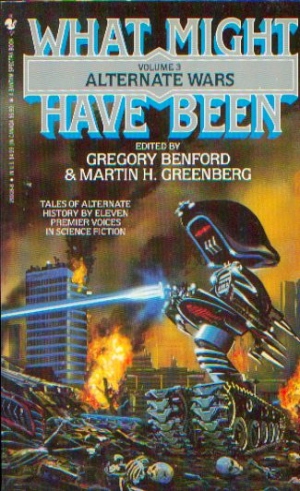Birthday Reviews: F.M. Busby’s “Tundra Moss”

F.M. (Francis Marion) Busby was born on March 11, 1921 and died on February 17, 2005. In 1960, Busby, along with his wife Elinor, Burnett Toskey, and Wally Weber, won the Hugo Award for Best Fanzine for Cry of the Nameless, which was nominated a total of three times. In 1943, he joined the US Army and was assigned to work on the Alaska Communication System, which forms the background for his alternate history “Tundra Moss.” Busby served as the Vice President of SFWA from 1974-6. His novels include the Demu trilogy, the Rebel Dynasty books, and the Rissa Kerguelen series.
“Tundra Moss” appeared in the third volume of Gregory Benford’s What Might Have Been series of alternate history anthologies with the theme Alternate Wars. Its only reprints have been in subsequent editions of that book.
Set during World War II, the Alaska Communication System (ACS) outpost on Amchtika Island is an integral part of the United States war efforts in the Pacific theatre, made more important by the fact that in this timeline, the US is concentrating its power on the Japanese. They figure they can worry about the European theatre later, with the exception of a small force there led by Dwight Eisenhower.
While the story focuses on Buster Morgan’s activities in Amchitka, Busby also allows peeks into the actions of Franklin Delano Roosevelt, a band of Japanese saboteurs operating on Amchitka, and scouts in the area as the Japanese attempt to destroy the communications lines and the Americans are trying to relay orders which will support a major offensive far to the south.
Alternate history stories often teach the reader something about a relatively unknown and seemingly minor part of history, and the ACS certainly qualifies in the regard. The fact that Busby was stationed on Amchitka brings a level of detail and realism to the story which would have been difficult to match with just research. The disjointed nature of the story, jumping back and forth between the different characters, tends to work against it. It would have been stronger with fewer viewpoint characters and a more singular focus.